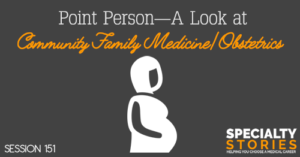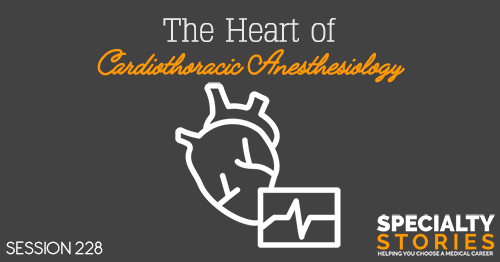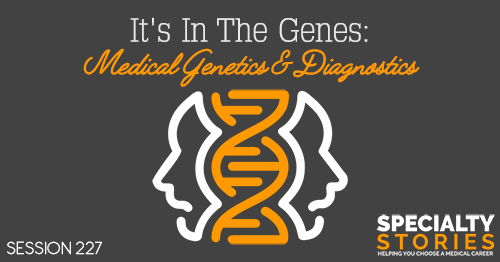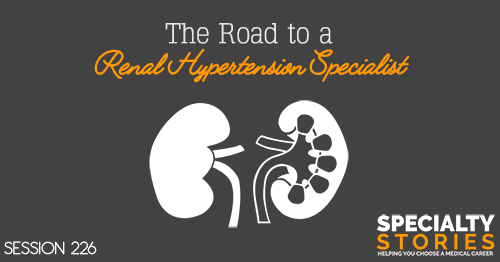Apple Podcasts | Google Podcasts
Session 151
Dr. Kristina Dakis is a community family medicine physician who specializes in maternity care. Find out why she thinks YOU should consider pursuing family medicine.
For more podcast resources to help you along your journey to medical school and beyond, check out Meded Media.
Listen to this podcast episode with the player above, or keep reading for the highlights and takeaway points.
[01:42] Interest in Family Medicine and OB
Kristina has actually known that she wanted to be a primary care physician since she was 16 years old. When she was in high school, her parents started developing health problems.
It became very obvious to her that they really didn’t have enough primary care physicians they can trust who are willing to be advocates in this country. Her father was an immigrant from Greece and English was his second language. And he struggled sometimes just with a language barrier with physicians. Other people in her family lost health insurance for a while. She felt that it was just really hard for them to talk to a doctor about the financial aspects and other parts of care, not just their list of medical problems.
“I want to be that point person in medicine for patients that are struggling to navigate the healthcare system.”Click To TweetThat being said, Kristina didn’t know what family medicine actually was until she got to medical school because she had only been exposed to internal medicine and pediatrics. She was lucky to have amazing mentors who were equally as passionate about the exact same things that she was. They wanted to work with vulnerable patient populations. They wanted to do more than just treat the medical diseases. They loved working on the social issues looking at the whole person. And that was what really drew her to family medicine initially.
Kristina actually trained in a big city. And for a while, she even wanted to be in academic medicine. She went through specialty after specialty after specialty over rotations, and she just adored everything. So it made sense.
[04:49] The Biggest Myths or Misconceptions About Family Medicine
One of the biggest myths is that you are too smart to go to family medicine. She was told that many times throughout her rotations, and Kristina says family medicine practice is incredibly challenging as you need to look things up everyday.
She’s currently learning how to treat Hepatitis C because being in a rural community, it takes forever to get them in with GI.
There’s a variety of patients that walk in her door and come her way. One moment, she’s taking care of a newborn and then she’s taking care of a geriatric patient, two minutes later.
“We probably need the smartest people in medical school going into any primary care specialty just because of how difficult it can be.”Click To TweetAnother myth is that you’re going to be bored in family medicine. Family medicine is not just prescribing Metformin and hydrochloric acid. Again, they manage a huge variety of things every day.
There’s also this myth that you’re not going to make money going into Family Medicine. If you’re going to work in a federally qualified health center in the inner city, obviously, you’re going to be paid less than if you go out into a rural area. You can make a lot more but there’s a lot of loan repayment options. There’s loan repayment through your employer. They also realize the need for primary care in this country and now they’re valuing primary care more. So every year, their salaries are increasing more than other specialties are.
[08:06] Thoughts on the Pass/Fail in Step 1
Kristina is personally thrilled about the changes to Step 1. She thinks eight hours of your life says very little about the kind of physician that you’re going to become.
[09:04] Traits that Lead to Becoming a Good Family Medicine Physician
You need to be someone that wakes up every day excited to be a part of people’s families. And Kristina really loves being a part of people’s lives and hearing stories and listening.
You need to be a good listener. You need to be patient. Smoking cessation counseling takes years, as well as preventive therapy, preventing STDs, and doing counseling on diet. Whatever it may be, you have to be patient. You have to be willing to sit down with people and also to help them when they have setbacks because everybody does.
In addition to being a good listener, you really have to be humble too. Because you’re learning everyday and things are always changing. You have to be resourceful and adaptable to know what specialists surveil in your community, how can she get patients access to these medications that they need these treatments. And like most physicians, you really have to be compassionate.
“You have to truly find joy and just being there for people and being a part of their families in their lives.”Click To Tweet[11:21] Family Medicine Physicians Doing OB Care
Obstetrics is a huge part of her practice. Kristina is a community family physician in a small rural area, in a critical access hospital. She’s in a labor and delivery unit run by family medicine physicians.
OB is a huge part of what she does. She adores OB in the context of Family Medicine approach to care because she gets to take care of the mom throughout the pregnancy. She’s at the delivery and then she gets to take care of the child afterwards.
There’s just all these amazing opportunities to help keep the family healthy. You’re seeing the newborn back for their wellness visits. Then she can talk with mom about depression. Or get her blood pressure if she’s having signs of preeclampsia. She can do all these things and it’s all coordinated.
As maternal mortality is getting worse and more OB-GYNs are specializing, as we’re seeing more labor and delivery units closing, family medicine approach to maternity care is going to become more and more important.
Kristina says they have seen a decrease in the amount of Family Physicians doing OB over the last several years. And in many ways, the reason has to do with malpractice. It’s regional.
“The family medicine approach to maternity care is going to become more and more important.”Click To TweetAs a result, family physicians are able to have more success with OB right now. A lot of that means they have to be out there advocating for reform and other other ways they can get access for patients.
Especially in rural communities, you’re looking at women having to drive two to three hours sometimes to deliver a baby. And people who have to drive outside of their community to deliver have worse outcomes. Another reason has to do with trying to keep rural hospitals open as well as the funding for rural hospitals. And then it’s a culture part too because in bigger cities there are more providers.
“We're going to see more family docs doing OB in general, hopefully as we just see more and more of a shortage of OB providers.”Click To TweetFamily medicine also has a lot of special training with a lot of these vulnerable patient populations in addiction medicine, transgender patients, etc. A lot of that in her training was all focused on primary care and prevention and that could be different settings.
[15:07] Typical Day
Kristina doesn’t really have a typical day for the most part. But in general, if she’s not on OB call or if she’s not on the labor and delivery floor, she gets to the clinic around eight o’clock and in mostly outpatient clinics for the whole day. Kristina sees patients four days out of the week. Her fifth day is administrative day where she catches up on charting.
She does a lot of different things in her practice. Some days, they will have more well-children or school physicals or acute visits. Other days, she’ll be doing geriatric wellness visits. She does a lot of women’s health and reproductive health and a lot of STD prevention. They also have a lot of teenage pregnancy in the area.
Kristina has incorporated a lot of addiction treatment into her practice because rural communities also struggle with a lot of addiction. She sees a lot of mental health, depression, anxiety, and a lot of preventive counseling. They see a lot of tobacco use, COPD, and cancer screenings.
The model of care is they deliver patients when they go into labor. She might be managing a laboring patient in her office and then when she progresses, she would do Cesarean sections. Some mornings she might wake up and do a scheduled section or assist a colleague in a section.
Especially in rural communities or in really underserved urban communities, sometimes this model works best. Kristina also has the option of doing inpatient adult medicine if she wants to. Although most of her practice is younger patients. She thinks medicine has become too depersonalized to be subspecialized because you need this point person to keep things streamlined.
“Investment in primary care saves money. Whether it’s family medicine, internal medicine, or whatever it is, it saves everyone money.”Click To Tweet[20:25] Training Path and Fellowships Down the Road
Family Medicine is a three to four-year residency after medical school. It’s similar to medical school because you rotate on pediatrics and obstetrics and then you do a lot of inpatient medicine, mostly adult medicine.
The rest of residency is very outpatient-focused. In an outpatient within the family medicine realm, you do a lot more prenatal care. You have patients in behavioral health, mental health, and you do more pediatric outpatient care.
As opposed to internal medicine or internal medicine pediatrics, a lot more of your time is spent in the hospital rotating with specialists. Then after three to four years of Family Medicine residency, if you choose, you can go on to do it.
There are a lot of different primary care focused fellowships. Kristina ended up doing a surgical obstetrics fellowship. She was a junior attending and she was essentially treated as a second year OB-GYN resident. She did all of the scheduled surgery in sections and she also took patients back who are going for a section. So it was very intensive surgical training for a year.
Additionally, she did tubal ligation patients and other things to help her be able to provide obstetrics in a community setting or obstetrics care.
“In family medicine, you get basic low risk vaginal delivery experience.”Click To TweetIn their hospital, they can’t keep anyone below 36 weeks. Obviously, pre-termers get transferred to a higher level of care, but she does lower special deliveries. She could do vacuum assist deliveries or Cesarean sections.
A community doesn’t need a bunch of subspecialists, they need someone that can take care of their community.
“It doesn't even make financial sense to hire six doctors when you could hire one that can do most things that the community needs.”Click To TweetOther fellowships include sports medicine, academic fellowships, palliative care, and geriatrics. Kristina also has friends who’ve done global health fellowships research fellowships and HIV fellowships. There are multiple directions within family medicine and there’s a lot more out there than people think.
[24:55] Message to Specialists as a Primary Care Physician
Kristina loves getting on the phone and talking with someone and feels like they’re creating a team. She thinks it’s great anytime a specialist even has a minute to just chat about a patient and to make sure they’re both on the same page. She loves connecting with other doctors and other fields because it helps with the continuity of care.
“We're all so siloed in work but we're all also in this together and the more that we could all work together, it makes the job more fun.”Click To TweetKristina also wants to know if she’s doing something wrong or if there’s something she can be doing for her patient so she doesn’t have to refer to them. She’s down with anything she can do to provide the best possible care.
[26:15] A Message to Her Pre-Residency Self
Krsitina went into residency thinking that she was going to be an inner city, urban, academic, family physician. But she realized she really wanted to be a community physician. She has fallen in love with rural medicine and she wouldn’t have even thought that would happen five years ago.
“It’s important to keep your options open. It's important to stay flexible. You just never know what's going to come your way.”Click To TweetThere’s just so much that you can do in family medicine. You could end up being involved in politics or being a community activist because they have a baseline training of everything. It serves them well in a lot of different leadership roles. You really have no idea where your career will take you and that’s very exciting.
[27:40] What Rural Medicine Is
Kristina is only a couple hours away from a big city. So she’s not isolated in Montana or somewhere else. She’s actually within 40 minutes from two other much larger cities that have universities.
“Rural medicine is an opportunity to serve a patient population that has historically not always had access to the care they deserve.”Click To TweetIn rural medicine, the patients are incredibly grateful. It’s rewarding to care for them and there’s so much you can do to make a difference. Unfortunately, in medical school, they don’t get as much exposure to community medicine in general.
Just keep in mind as you’re going through medical school, that there’s more to medicine than academic and urban that you see all the time.
[29:57] Most and Least Liked Things About Her Specialty
Kristina loves being a part of people’s families. People come in and they bring pictures from birthdays. They’re excited to tell her about milestones.
She finds there’s just something amazing about being there for the first prenatal visit and being with them throughout the whole pregnancy, being at the delivery, and walking into the room. Then she finds everyone in the room being thrilled to see you when you walk in. Then for the next several years, you get to watch the children grow up, watching the family grow together, and being there for everybody.
“It's a really amazing window into someone's life and they really appreciate the work that you do.”Click To TweetKristina admits she can’t imagine not having that connection with people. She can’t imagine delivering the baby and then not taking care of the kid. It just doesn’t feel right to her.
On the flip side, what she likes the least is the paperwork. Although there’s a lot of different models and approaches to care too, she wouldn’t be too worried about. There are different ways to avoid burnout depending on the practice setting. You just have to learn to be strategic about getting your charting done as soon as possible.
That being said, being in a smaller community, Kristina has relationships with her administrators as opposed to a massive hospital system, where sometimes you feel disconnected from them.
[32:29] Major Changes Coming to the Field of Family Medicine
Family medicine is going to become more and more central to healthcare. We’re going to see more value placed in family medicine and primary care in general.
Healthcare is headed toward a cliff because we pour money into tertiary care and end of life care. And family physicians are in the best position to spearhead that and we’re going to see that exploding over the next several years.
“There's all this unnecessary spending that we're doing that we could decrease by putting more value in prevention and primary care.”Click To TweetKristina is very hopeful and excited to be starting her career now. She thinks we’re going to see more family physicians and we’re going to see this swing back. We’re going to see more family physicians doing more full scope just because we’re realizing that we just need it.
She adds that the cool thing about their specialty during the COVID pandemic is when people have been going down or we haven’t had enough physicians or staff support, they can work in the ER. They can go to the ICU and they can do inpatient care. They can do urgent care and deliver people in the second stage of labor.
[34:47] Final Words of Wisdom
If she had to do it all over again, Kristina says she would still have chosen the same specialty.
Finally, she encourages premeds to do what your heart is telling you to do. Don’t do what eight hours of your life tells you. Do what brings you joy because this is going to be your career. It’s a lifestyle.
“This is a huge part of your life. You want to wake up every day excited to go to work. So just ask yourself, what is it that you want?”Click To TweetDon’t listen to the attending on whatever rotation that tells you you’re too smart to do that. Or that you’re going to be bored in that specialty. Or that you’re not going to make money. Again, just do what do you want and do what brings you joy. And if you do that, you will find the job you will find your fit.
Ask yourself, what do you want? And then where do you feel you fit and then go for it and it will work out!
Links:
SEARCH SITE
LISTEN FOR FREE












